Ravi and Malvika are a newlywed couple. They have recently bought a house where they plan to move in along with his parents. The whole family is happy. Ravi takes a good look at his brand new house and says “So, we don’t have to worry about the home for a long time… ah, finally!”
Days pass and within a few months, Ravi notices that the wall in one of the bedrooms has developed dampness. He thinks, it is temporary and does nothing. Soon the paint and the plaster start coming off – just after one year of construction! A frantic Ravi starts looking for a solution when a civil engineer friend advises him to look for the cause first. Ravi visually checks the window sides, the exterior walls, the ceiling and the roof but finds no crack / gap whatsoever in any possible place of leakage / seepage. He could not find the source.
And this is not all! Frequent tripping of circuit breakers starts giving his family the feel of living in a haunted house. What could be a happy one year completion of living in a new house turns out to be a matter of frustration for Ravi. After all, he had invested his hard-earned money in this house of his dreams.
Small damage in the house can turn out to be a big headache later. This kind of damage or potential safety issues can be detected well in advance (even after buying a house or if you are building a new house) with the help of Home Inspection. The importance of home Inspection is multiplied when the house is several years old.
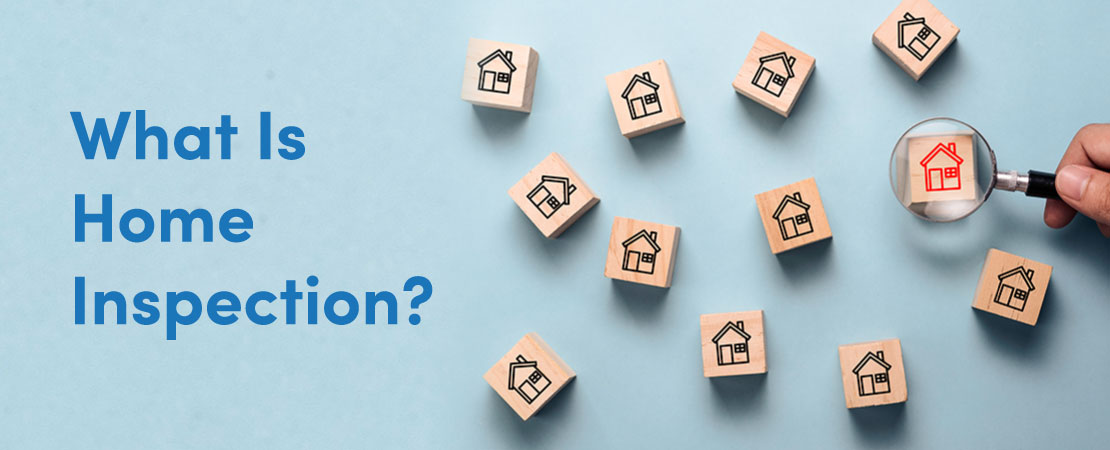
What Is Home Inspection?
A house has multiple components. There are so many rooms and passages. In each unit of space, there are so many elements and accessories. All these are essential for making a house an ideal place for living. Each of these elements is connected to each other (maybe not physically). When one of the parts of the house is damaged, it can impact other parts of the house too. These damages and faults can make the lives of people living there uncomfortable. Many times, these damages can lead to safety & health issues.
It is, therefore, necessary to inspect your home in order to detect these damages and prevent unwanted hassles. Early detection of damages and faults is beneficial – you can fix the issues without spending much money.
Home Inspection is thus worth opting for. Doing Home Inspection today will save you a lot of money tomorrow. What’s more, with Home Inspection, you can make sure that your house – your abode – is safe for your children and other family members.
What Does A Home Inspector Do?
A Home Inspector or rather – a Home Inspection team does a systematic review of the whole house along with everything in the property. All the areas of your property along with all the 7 elements (wall, ceiling, floor, doors, windows, plumbing, electrical) are checked and much more. Here is a list of things that home inspectors look for when they visit a house.
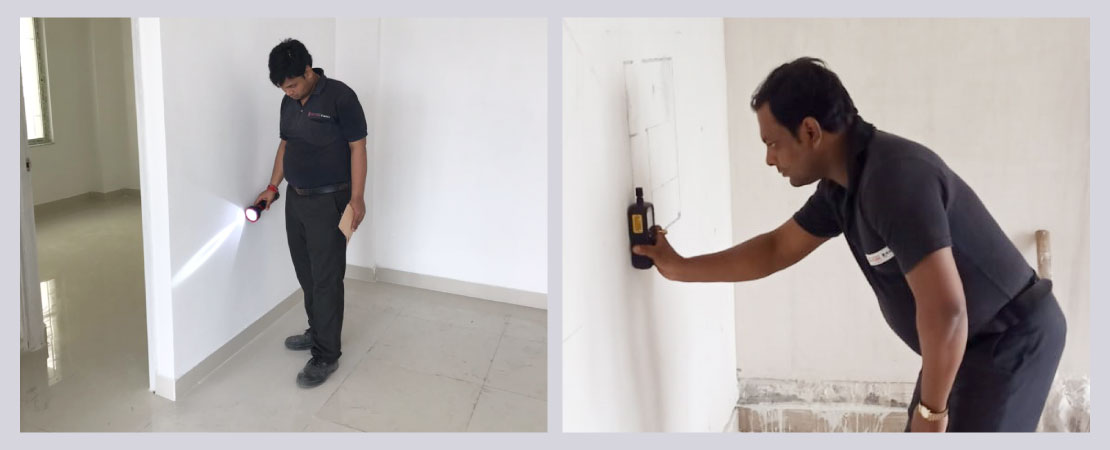
Wall Inspection
India is a tropical country. The climate here is moist as monsoon dominates the seasonal cycle. This aspect makes the houses in India susceptible to moisture-related dampness. The Home Inspection team uses state-of-the-art moisture detection tools to look for moisture within the walls. This is a completely non-invasive procedure using modern thermal imaging – infrared technology. The team can tell if any wall has started to get damp without even touching the walls.
Besides, other issues like cracks, defects based on finish like efflorescence, hollowness etc are also diagnosed with precision by home inspectors.
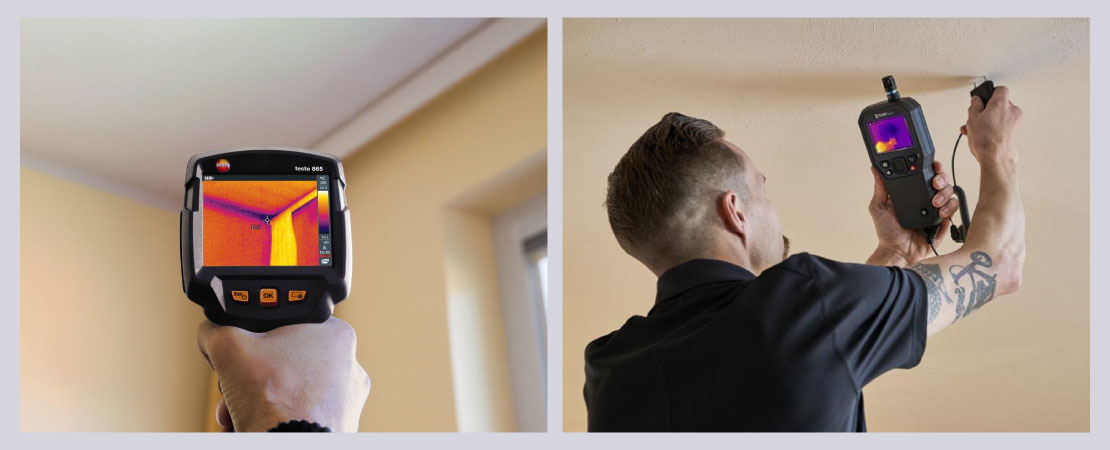
Ceiling Inspection
A ceiling is an overhead interior surface of a room or area. It can be made of RCC or masonry finish or can be a false ceiling. The things that are checked by home inspectors varies depending on the type of material. Unevenness, undulation, crack, and other surface deterioration or damages are commonly checked in most types. Similar to walls, visual signs of moisture or water stains are checked too in the ceiling. Identifying and detecting the root cause of stains or other forms of moisture is an important step in dealing with it. It is significant to find out the main reason behind the stains.
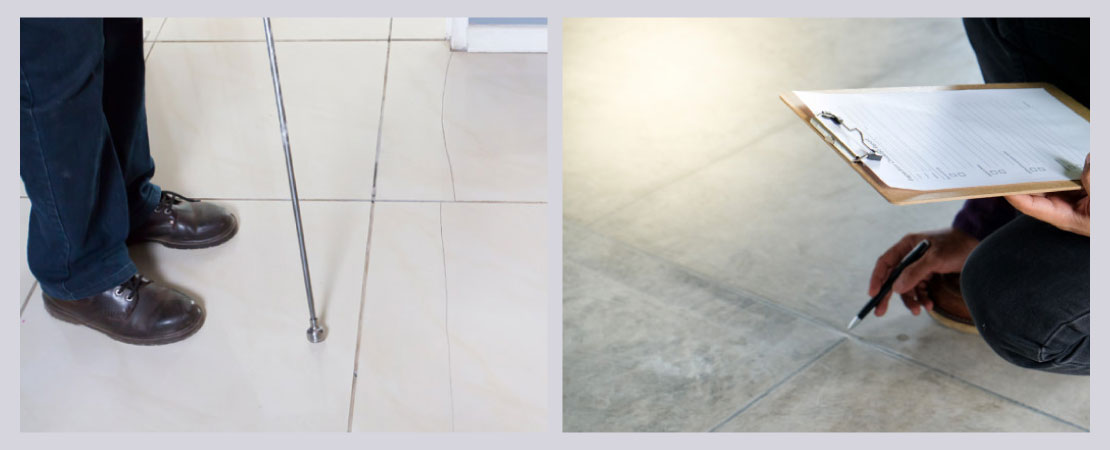
Floor Inspection
When you enter your house, flooring is the first element you feel. Flooring adds to the aesthetics of the room. There are various types of flooring materials – tiles, marble, mosaic, neat cement flooring etc. Considering common flooring(tiles), lot of parameters are checked by the home inspection team like Hollowness on tile, cracked/broken tile, gaps at tile joints, skirting fitted or not, the slope at wet areas, surface damage, etc. These points have their separate significance. Like it is necessary to check any hollow tiles present in flooring or dado. If there is any, then it can crack or get damaged on regular use. This can lead to seepage or other moisture-related problems. Similarly, the gap at tiles and the incorrect slope will lead to seepage and other deterioration which will create unhealthy living conditions. So, to avoid major repair cost and have hassle-free homes & living, it is essential to check floors properly.
Door Inspection
The home inspectors check if the door moves smoothly without any friction with the floor beneath. They also look for termites and other pests and any signs of damage resulting from them. Since India is a place where there is too much moisture, the home inspectors see if the wooden door is damaged by moisture and humidity. They look for any bulging or cracks. Along with that, they make sure that the hinges are rust-free.
What are the other issues that are usually found in the inspection? – Cracked door frame, the gap between frame and wall, presence of borers and termites, and overall firmness and stability of the structure.
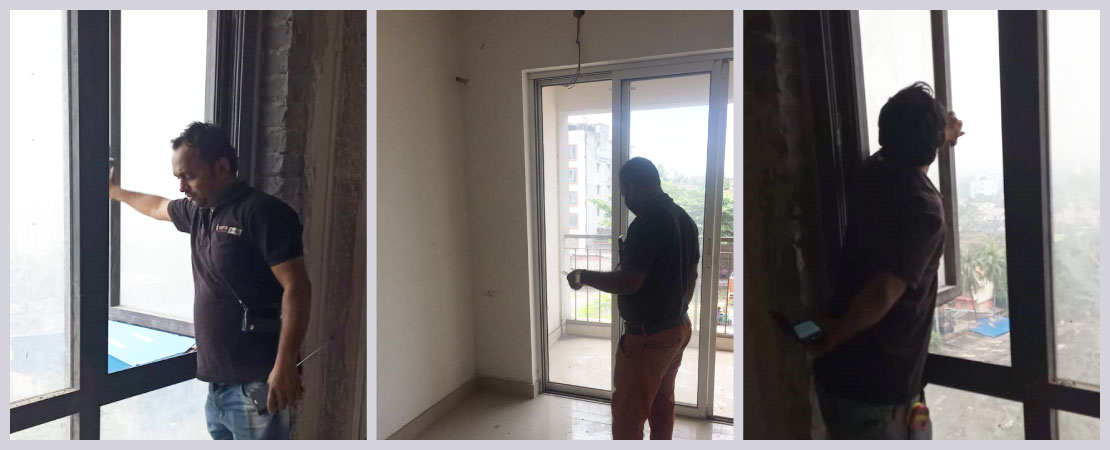
Window Inspection
Home Inspectors look for damaged wood or other material (like metal or UPVC) while inspecting windows. They especially focus on the window sills, their height for safety concern and look for any damage there. A damaged window sill can cause rainwater to seep into the house. Similar issues can arise if the drip mould at the chajja is not provided.
The overall window installation is brought under the scanner because resolving the operational and functional issues becomes more important than anything else. The inspectors see if there is any gap between the wall and the window frames as that can lead to seepage and improper heat exchange between the interior and external environment.
The importance of windows gets enhanced if there is a window AC installed. The home inspectors will ensure that the AC is fixed properly with no loose fittings whatsoever.
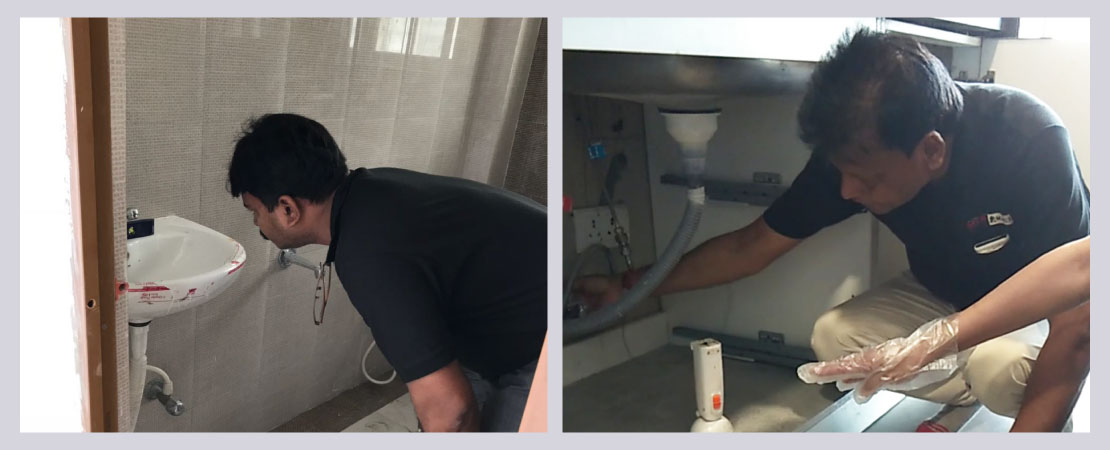
Overall Plumbing
The Home Inspection team will check for the overall health of the plumbing system of the house. Beginning with the cursory examination – checking the faucet, drains, water pressure etc – the inspection team will look for plumbing issues in a much more in-depth manner.
i. Bathroom
Under plumbing inspection, special attention is given to the bathroom which happens to be the den of moisture.
The main problem that happens in the bathroom is the blockage of drains. The Home inspector looks for signs of blockage of the drains – the main drains, the drain on the sink etc. Along with that, the inspection team will inspect the floor of the bathroom to see if there is presence of water pocket, deterioration at tile grout etc. Since the walls of the bathroom are more susceptible to water damage, the inspection team will look for extra measures taken to avoid water damage. A good Home Inspection team will also look for potential causes of water wastage – like dripping faucets, leakage in the shower pipe etc.
Bathrooms can be a conducive place for the moulds to grow. The Home Inspection team will look for moulds and stains. Along with that, it will ensure that the exhaust fan is working properly to remove odours, steam as well as for proper ventilation. Hence bathroom inspection will reveal potential issues that can create further hassles if left unnoticed.
ii. Kitchen
Just like bathrooms, kitchens are also susceptible to water and moisture damage. Home Inspectors look for signs of moisture-related damage in the Kitchen. They make sure that the wiring in the Kitchen is done with safety in mind. The team will also examine if the kitchen is well ventilated. There can be plumbing issues present in the kitchen like a dripping faucet, water not draining properly at floor & counter etc.
To know about other things which are looked at by Home inspectors in Kitchen & bathroom, Click here.
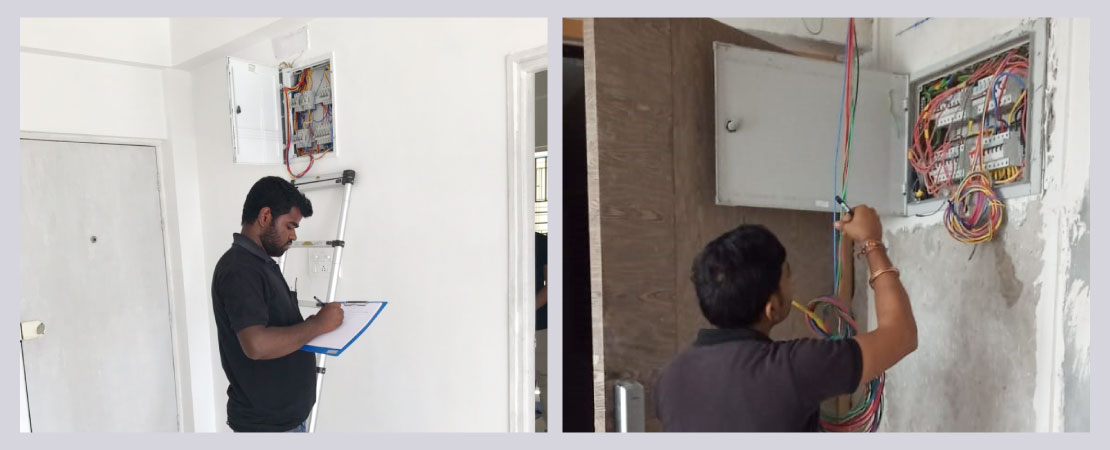
Wiring & Electrical System Inspection
Electrical safety is crucial to the overall safety of the home. Issues like tripping or sudden blackout can indicate bigger hidden problems. A home inspection team has dedicated people who check the electrical wiring & system in the house. They check if there is any loose, naked electrical wire in the house, if the outlets are working properly, if there is any chance of a potential short circuit and most importantly, does the house have proper earthing or not. All these aspects and more are covered by the inspection team. Even minor issues like dysfunctional/jammed switches are not ignored. Each and every switch board and point where a home appliance is plugged in is checked for possible a short circuit / damage.
Roof Inspection
An inspection of the roof is important. And this includes checking of the floor for any crack, faulty sloping, etc. If the roof of the house doesn’t allow the water to pass due to clogging of the rainwater outlet, it can seep in and damage the interior ceiling and walls of the house.
Along with that, home inspectors look for vegetation growth on the roof that can cause much damage with their roots. Having said this, rooftop gardening has become popular in many places. Home inspection services check whether it is properly laid or not.
Home Inspectors also check the parapet wall condition and the strength of the railings attached to the roof to ensure that the roof is safe.
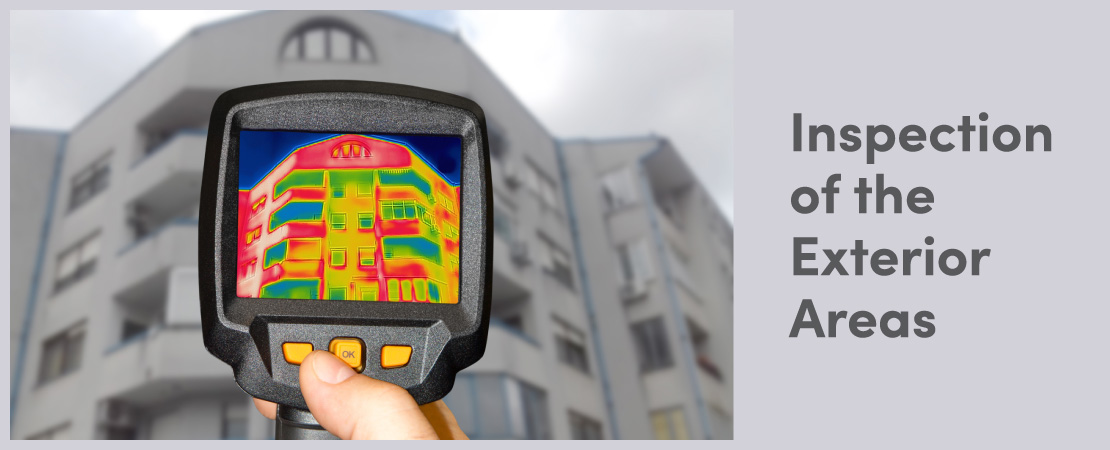
Inspection of the Exterior Areas
The same extensive checking is done on the exterior part of the home too depending on the requirement of the customer. The Home Inspection service looks for any damage to the exterior facade of the house. Are the exterior walls painted with waterproof paint? Is there any leakage in the pipes that is making the exterior walls wet? Is the exterior of the house free from any moisture-causing issues like mounds of mud, bad drainage, cracks, etc? Are the staircases safe to use and railings are sturdy enough… and so on.
The home inspection team does not just check the house, it also checks the surrounding ground. It looks for areas that can get slippery during the monsoon. It also examines if there is proper drainage that lets the water flow out of the property of the owners. The Home Inspector also looks for potential damage that can be caused by tree roots. It examines if there is any tree that is too close to the exterior part of building.
So, you can see that Home Inspection is not just a superficial glance at the house to look for small faults and damages. It is a comprehensive examination of all the aspects of the home. A professional home/property inspection services will let you have a peaceful future ahead. No unexpected issue will crop up. Hence it will protect your most important investment of life i.e. Home from unwanted / unforeseen damages.

